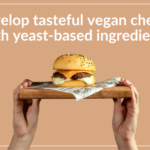Our consumption habits have changed significantly in recent years, particularly regarding our relationship with animal food products. More and more consumers are replacing them with vegetal products. A newly growing market where yeast extract perfectly fits as a clean label ingredient and is spectacular for taste building.
The growing market for cheese substitutes
The global animal products alternatives market, dominated by dairy substitutes, is growing. With a value of US$17.3 billion in 2018, it is expected to reach US$29.6 billion in 2023[1]. That of cheese substitutes is still marginal. It represents only 1% of the market for plant-based products, or US$445 million in 2018.
However, it is developing rapidly and has a projected CAGR of 8% between 2017 – 2021[2]. Although the overall number of products remains “low”, the launches are growing. We observe +8% of launches worldwide between 2015 and 2019 (24 vs. 44)[3]. The European and North American markets are the largest contributors to the expansion of the cheese analogue market[4].
Why is there such a craze for cheese substitutes?
As with dairy analogues, the increase in special diets (flexitarian, vegetarian, vegan, lactose-free, etc.) is the first growth factor in the market. Consumers are looking for healthy products and some consider cheese substitutes healthier compared to the dairy products. Often based on oilseeds, cheese substitutes are interesting from a nutritional point of view. Indeed, oilseeds can provide unsaturated fatty acids. In addition, some cheese substitutes are allergen-free, lower in calories and/or less rich in salt. They are also often GMO-free. Finally, cheese substitutes generally have a longer shelf life, which can be a great interest for the consumer.
Food industries, aware of this market potential, started producing cheese substitutes. We can quote Superbom, a Brazilian company that offers low-calorie and allergen-free cheese substitutes to Brie, Cheddar, Parmesan, Mozzarella, etc. Similarly, VidaVeg offers cashew cheese substitutes. Many other brands such as Followyourheart, Daiya, The Alternative Dairy Co, or Bel group with his half-plant, half-animal product, have also taken up this challenge.
The challenges of cheese substitutes for food industries
Cheese is probably the least easy product to imitate because its flavors and functions are very complex. And the uses and expectations are not the same with Emmental or Camembert. The main challenge in R&D is to produce cheese analogues with a variety of cheesy tastes, textures, smells and an ability to melt. Manufacturers also need to control specific off-notes due to ingredients like soy. Finally, and to meet consumer expectations, the nutritional composition must be close to cheese, particularly the calcium content, the ingredients as natural as possible and clean label…
Another challenge comes from the naming of the cheese substitute. Regulations are very strict in some parts of the world, where the designation “cheese” is reserved for animal products. Substitutes must evoke cheese for consumers, without going too far in the speech.
Yeast extract, a solution for the cheese alternatives market
Yeast extract is ideal for taking up these challenges; it is a key ingredient for the development of cheese substitutes. Each yeast extract has its own taste properties and several can be combined with each other in recipes for complementary benefits. In vegan cheese, some bring specific cheese notes while others intensify ripened flavors of cheese. Some yeast extracts reinforce the feeling of smoothness, add creaminess, increase savory perception and help reduce fat. Generally, yeast extract provides an umami taste to boost and balance the flavors of the recipe, and sometimes also to reduce salt. A new yeast-based ingredient, Springer® Mask 101, even covers and/or neutralizes the plant protein off-notes.
Ultimately, yeast extract is suitable to a clean label approach by limiting the use of artificial ingredients for taste building. It is also interesting for composition: it provides protein and is 100 % animal-free. Food manufacturers face real challenges when it comes to cheese substitutes. They must meet consumer requirements in terms of taste and enjoyment as well as composition. Yeast extracts, through their taste, vegan and natural benefits, are the allies of choice to meet these complex challenges. There is always a solution with yeast extracts, whatever the type of product envisaged.
Biospringer is a specialist of yeast extract.
It is recognized worldwide as an historical key player and global producer. Its expertise through teams of technologists, flavorists and expert tasting panels ensure total safety and a high quality of all the products manufactured and sold in the world. Its global network of Culinary centers is dedicated to helping customers find technical solutions to bring good taste to their recipes. Biospringer is strongly committed to meet both consumers’ and producers’ expectations by guaranteeing high quality standards and offering various additional benefits in line with the current natural, vegan and clean label food trends.
To know more about it
[1] Markets and markets, Dairy Alternatives Market, 2019
[2] Nutrikéo 2019, d’après Future Market Insights, Grand View Research, Technavio, Hexa Research & Markets and Markets
[3] Mintel GNPD, 2019
[4] Transparency market research, Cheese Analogues Market, 2018









